The Mothering and Albinism Research-Advocacy-Policy Network facilitated a Public Forum in Pretoria on October 2nd, 2023 to share the findings of our project on the resilience of South African mothers affected by albinism, whether they have albinism themselves or have children with albinism. The Forum was in partnership between the University of Pretoria’s Health Science department and Centre for Human Rights and Trinity Western University’s School of Nursing. The Forum was attended by approximately 75 attendees comprised of our research team, persons with albinism, mothers of children with albinism, government officials, and albinism advocates from across South Africa. Our aim was to mobilize knowledge from our research project to raise awareness of the circumstances of these mothers and give recommendations for how to foster their resilience.
Having albinism has got a new story every day; every day in your life you go through a challenge. So, spreading a word or sharing knowledge about albinism out there would help a lot of mothers.
South African mother of a child with albinism
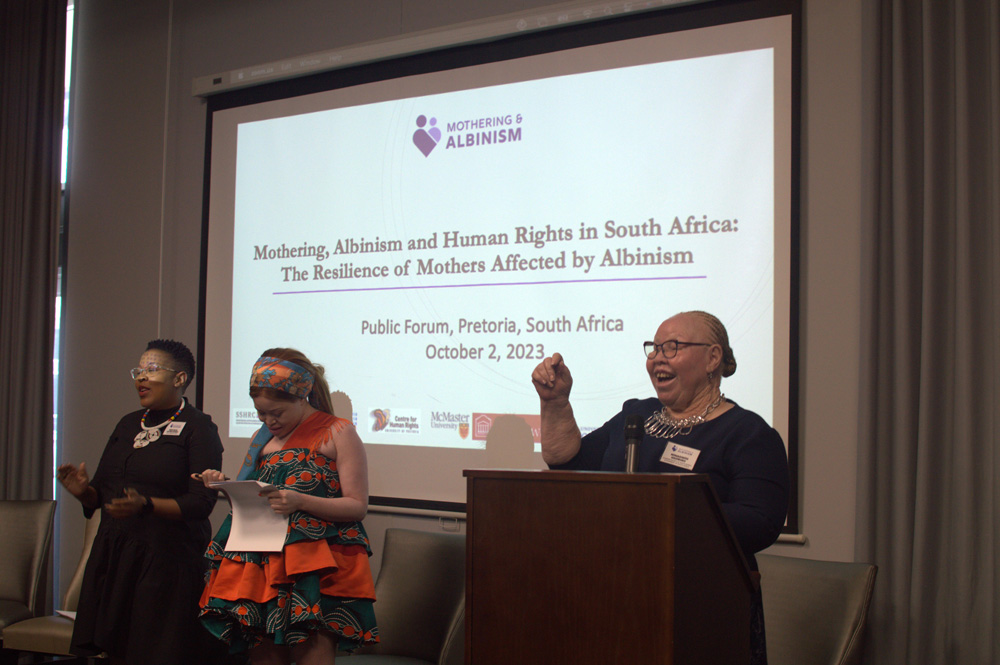

The Public Forum was hosted by Innocentia Mgijima-Konopi, Atlantic Fellow for Health Equity South Africa and Puleng Molebatsi, a mother with albinism and an actor, producer and radio host in South Africa. We shared the findings of our research project with three newly created resources. First, we discussed the release of our South African report, with an emphasis on highlighting the voices of mothers. It also provided targeted recommendations and resources to support mothers impacted by albinism and their children.
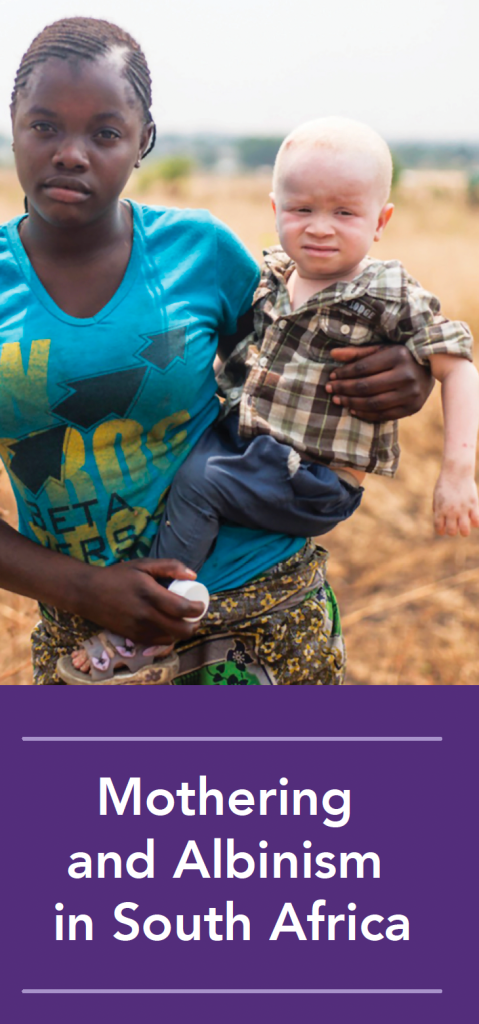
Second, accompanying the report was an informative pamphlet for parents who have newly given birth to a baby with albinism about what albinism is and the care needs of the child.
Lastly, a short film was premiered that was produced by Puleng Molebatsi, featuring mothers and their children impacted by albinism as well as advocates and healthcare providers in Northern Cape and Gauteng provinces of South Africa.
Commentaries to the report and film were followed by mothers impacted by albinism.
- Tshego Keitsemore, a mother of a child with albinism and founder of the Reamogeleng Community Organization
- Thembisile Madlala, a mother with albinism and founder of Albinism Society KwaZulu-Natal KZN
- Lorraine Tshuma, a mother of a child with albinism and founder of the We Are People Foundation
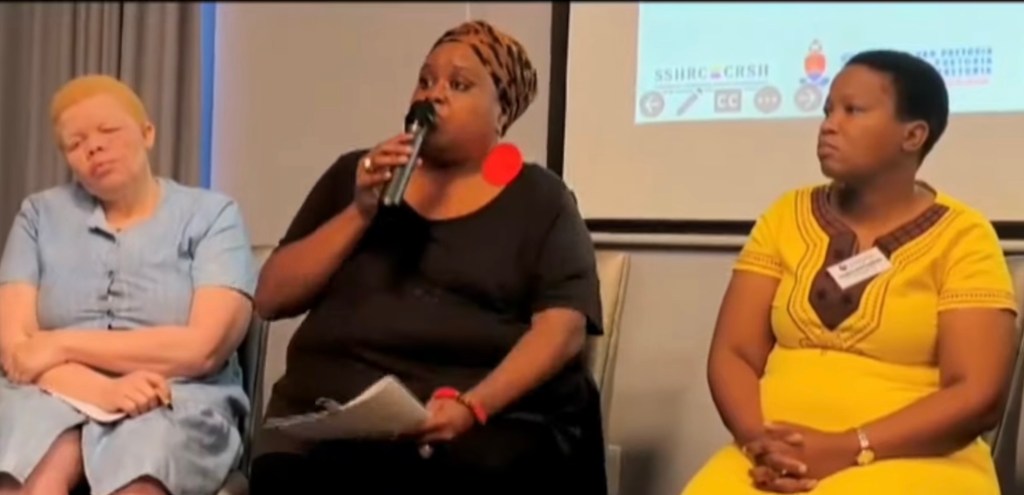
They shared their experiences when they gave birth and in raising their child(ren) with albinism. Despite the challenges they faced in accessing healthcare, education, government support and the varying unfavorable responses from their families and society, these mothers grew in resilience when they had Respectful Maternity Care, partner/family/community support, health education and genetic counselling, advocacy and peer support from NGOs, and access to health services including skin and vision care.
When you support a mother, you support a child.
– Mpho Tjope
Their personal experiences placed them in a position to become activists in advocating for their children and the rights of persons with albinism within their communities resulting them setting up their own respective organizations. These mothers shared their personal stories to spread awareness and called on stakeholders in healthcare, research, and government to improve access to the rights of persons with albinism in South Africa.
Government officials, albinism advocates, and a healthcare leader also commented on the report and the film.
- Muluka-Anne Miti-Drummond (United Nations Independent Expert on the enjoyment of human rights by persons with albinism)
- Mariska Van der Walt (Deputy Director: Disability Rights, Gauteng Office of the Premier)
- Dr. Ramadimetja Shirley Mooa (Head of Department, Nursing Science, University of Pretoria)
- Phuti Mabelebele (Chief Director: Advocacy and Mainstreaming Rights of Persons with Disabilities, Department of Women, Youth and Persons with Disability in the Presidency)
- Patrick Wadula (Chairperson, National Albinism Taskforce South Africa)
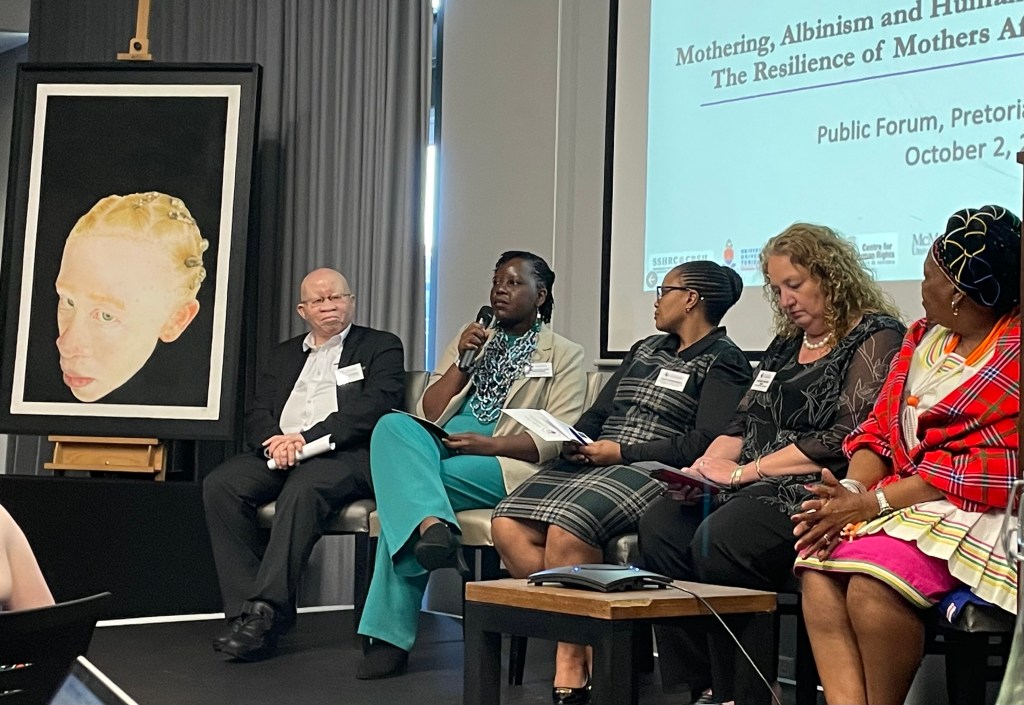
The panel members emphasized the importance of human rights in the discussion of persons of albinism. They engaged in discussions with the attendees regarding the application of disability rights and the continuous challenges faced by persons with albinism and their families in accessing resources like grants and funding.
The focus on mothers and their experiences was highlighted by a gallery display. We featured a stunning self-portrait entitled “Ndijonge II” by Athenkosi Kwinana, an artist with albinism in South Africa. Also, a collection of portraits of mothers impacted by albinism and persons with albinism in Africa by Adebayo Okeowo as well as photos of the behind-the-scenes filming of the “Mothering and Albinism in South Africa” film surrounded the attendees. These artwork and portraits symbolized the focus of our Public Forum on Albinism, Mothering and Human Rights.
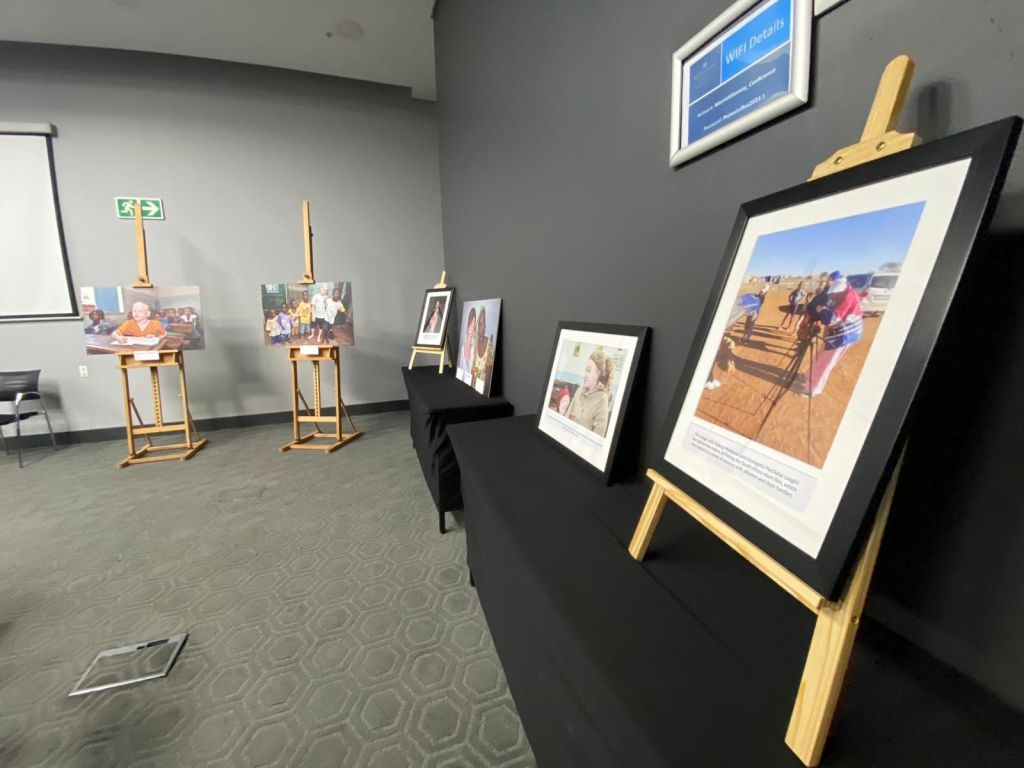
We heard many positive responses from attendees about the outputs from the project and strong commitments from key stakeholders to protect the rights of mothers and children impacted by albinism.
Recommendation Highlights:
- Raise awareness about albinism; work with your community such as policy makers, advocates, healthcare providers, educators, faith leaders, traditional healers, and community members.
- Embrace the baby with albinism and affirm that they can thrive when embraced by their family and community.
- Ensure parents are provided education about the genetic causes of albinism starting at birth.
- Provide necessary support for mothers and their children, including access to skin and vision care and sunscreen and access to disability grant.
- Empower the work of non-governmental organizations and civil societies through awareness and funding
- Strengthen and implement government policies on gender equality and disability rights
To learn more, various media platforms highlighted the Public Forum:
- Stories Untold from SABC News: click here.
- Centre for Human Rights: click here
- Trinity Western University: click here.
- Rekord: click here.
